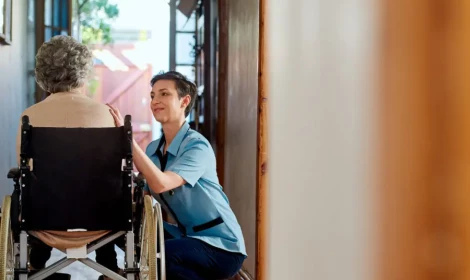Caregiver Stress: What You Can Do
Being a family caregiver is no small feat. Balancing your own needs with those of the person for whom you are providing care is tricky. Here are some ideas for coping and giving yourself a much-needed boost:

Being a family caregiver is no small feat. Balancing your own needs with those of the person for whom you are providing care is tricky. And we certainly do “trick” ourselves into thinking we can continually do it all – by kicking the proverbial can down the road when it comes to our self care.
Many family caregivers not only procrastinate taking steps to care for themselves, they assume there will be time later to take the time to have that walk, share that cup of coffee with a friend, or whatever it is that gives you pleasure and respite from the demand of your loved one’s needs. Sound familiar? By the time you realize how you have neglected yourself, the damage to your own well-being may be harder to repair. Here are some ideas for coping and giving yourself a much needed boost:
1. Breathe
Our marvelous human bodies do this all on their own; but notice your own breathing – is it deep, long, full or short, staccato, shallow? Try this: Inhale for the count of three, exhale for the count of six (or some version of that). The point is to breathe deep into your belly, let the breath rise to your collarbone and then reverse with a longer exhale than inhale. You will be amazed at how soothing three or four deep breaths can be to your system
2. Recharge
Give some thought to what this might mean to you…..what might be an outlet for some of your excess thinking, doing, planning? Writing for some, can be a wonderful release. Write in a journal that is for your eyes only. For others, a walk in nature, a trip to the ocean (if you live near one), sitting under a tree and reading a book – your version of any of these could give you the boost you need to keep going. The idea is to pause the endless thought process that is part of being responsible for a loved one.
3. Listen to music
Music has a profound effect on just about anyone. Pick music that fills you when you hear it! Whether it is soulful or lively, lyrical or intense, whatever feeds you (and this might be different at different times) is just the right kind. Sometimes putting a headset on and shutting out everything else allows you to simply enjoy the music without distraction which can be very healing.
4. Dance!
We’ve all heard the expression “Dance like no one is looking”. Find some music that makes you want to get out of your chair and move your body – even for five or ten minutes – you’ll be surprised at how therapeutic this can be. If you can, just let loose – no one is looking!
5. Create something
Write, cook, paint, rearrange your furniture, whatever might help you get into another part of yourself than the part that is vigilant and strategic. Only you know what that might be. Take a few minutes to think about what this might be – perhaps something you used to do when you had more space and free time?
6. Ask for help
Why is it that as caregivers, we often don’t ask for help when we need it the most? Sometimes people around us simply don’t know how to offer, or feel at a loss watching someone they care about become increasingly overwhelmed and distant. Asking for help is difficult for many of us and we often don’t realize that people close to us can feel helpless or awkward about understanding what you, as a caregiver, might find useful. Take a deep breath and ask.
These ideas are ultimately about self-reliance and taking care of yourself. No one can do it for you – hopefully this can be a platform from which you can launch some good self care practices before, during, and after caregiving!





